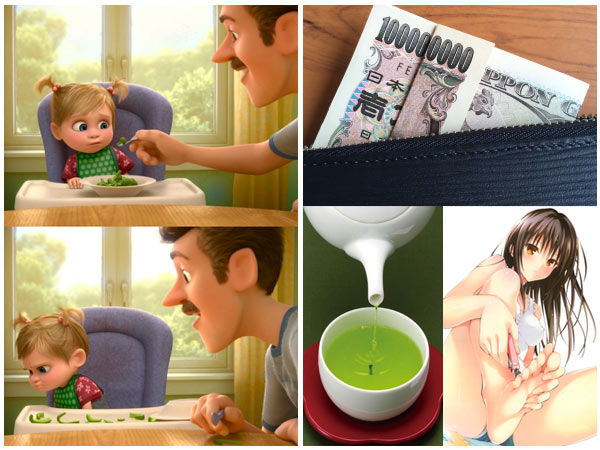I’ve been a student of animation all my life, ever since I fell in love with Star Blazers/Space Battleship Yamato, which had an epic galaxy-spanning story in which people actually died in dramatic ways, something unheard of in the 1970s. The history of animation is the history of technology, and progress has always meant changes in how that animation is created. This includes the rise of computer coloring methods that did away with painted cels in the 1990s and the new (and still somewhat annoying) trend towards 100% computer-created animation using the “cel-look CG animation system” developed by Graphinica, used in Knights of Sidonia and Expelled from Heaven. This trend towards digital production means that we might be entering an era of “customized animation,” which we got our first taste of this week when it was reported that the Pixar film Inside Out substituted green peppers for broccoli for the Japan release, because Japanese children hate green peppers more than anything. Customized content is already a thing in Asia: a Korean children’s show about talking cars digitally altered its content to remove things that might be offensive in Muslim markets, and I caught a documentary about how the upcoming Dragonball series was made so that content could be tailor-made for each country, in the event of whiny “think of the children!” lawmakers who object to depictions of blood and violence.
One thing about the Japanese: they love superstitions. Don’t cut your fingernails at night or you won’t be able to be with your parents when they die. Never write the name of a person in red ink or they’ll die. If a stalk of green tea stands upright in your cup, you’ll die…actually no, you’ll have good luck if this happens. Many of Japan’s superstitions are about money. The word ご縁 go-en means a lucky chance meeting, and since this is also how you say “five yen,” the 5 yen coin is considered lucky, which is why omamori good luck charms often have 5 yen coins inside them, like this one. A few years ago there was a rumor that if you used a picture of flamboyant actor/singer Miwa Akihiro (the voice of Moro the wolf from Princess Mononoke and the Witch of the Waste from Howl’s Moving Castle) as your phone background, you’d get a lot of money that year. Recently my wife showed me a 10,000 yen note (the equivalent to a $100 bill) which she’d folded over once so that it appeared to be worth 100,000,000 yen ($1 million). Keeping a bill folded like this tucked away in a wallet is a popular good luck charm in Japan now, she explained to me, though she cautioned that it was important to keep the bill inserted upside down, or money would flow out of the wallet, instead of in.
We’ve got some interesting things happening around here, namely the impending launch of our 100% all-new website, which we’ve been hard at work on for a year. The new site will be great: a totally reworking of the J-List website running on cutting-edge hardware, built so that all features work great whether you’re using mobile, tablet or desktop. While you wait for the new site to launch in mid-August, use the new $20 coupon to make an order from the current site!
J-List’s Facebook page is a popular place to get updates about new J-List products, as well as enjoy the fanart I post for everyone to share and comment on. This week we crossed 400,000 “likes,” so we decided to have another awesome flash sale for everyone. Take $20 off any order of $100 or more from now through Tuesday, August 4 (California time) using code JLIST400! Limit one use per customer, and it can’t be used on certain items (iTunes Japan cards etc.).

















